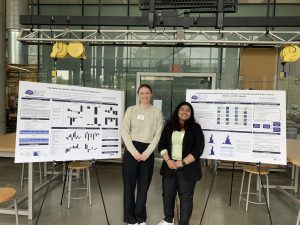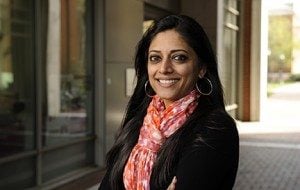 ety chapters of Johns Hopkins University and University of Maryland at College Park.
ety chapters of Johns Hopkins University and University of Maryland at College Park.Kyra Bowden and Sayantika Roy Present their Epilepsy Research
 ety chapters of Johns Hopkins University and University of Maryland at College Park.
ety chapters of Johns Hopkins University and University of Maryland at College Park. ety chapters of Johns Hopkins University and University of Maryland at College Park.
ety chapters of Johns Hopkins University and University of Maryland at College Park.The Sarma Lab is thrilled to congratulate Luis Sanchez who was awarded the NDSEG Fellowship! Out of 3392 applicants, Luis’s exceptional STEM achievements have been recognized. The National Defense Science and Engineering Graduate (NDSEG) Fellowship program was established in 1989 by direction of congress as an approach to increasing the number of United States (U.S.) citizens receiving doctoral degrees in science and engineering (S&E) disciplines to DoD Relevance.
The NDSEG Fellowship Program is sponsored by the Air Force Office of Scientific Research (AFOSR), the Army Research Office (ARO), and the Office of Naval Research (ONR) under the Office of the Under Secretary for Research and Engineering. This program is administered by Systems Plus, Inc.
Awardees receive full tuition and all mandatory fees coverage for up to 36 months and a monthly stipend of $3,600, up to $1,600 annually for health insurance coverage, and $5,000 travel budget (all expenses paid based on the Government travel policy per year for training and/or conferences that support their educational initiatives) and $1,500 non-travel professional development budget.
Sri Sarma was selected to receive an NIH Outstanding Investigator Award meant to help investigators make meaningful contributions to neuroscience by providing greater funding stability, flexibility, and support for overall research projects by funding up to $750,000 per year for up to eight years.
Sri’s proposal for the award, “EEG Biomarkers Derived from Dynamical Network Models Enable Rapid Paths to Accurate Diagnosis and Effective Treatment of Epilepsy,” seeks to establish novel EEG biomarkers and computational tools that will enable rapid and accurate diagnosis of epilepsy followed by a rapid path to an effective treatment.
Such a program entails major advances in conceptual knowledge of how epileptic cortical networks behave and change during drug and stimulation treatment, gleaned from dynamic network models (DNMs). Her lab has pioneered derivation of novel EEG biomarkers for epileptogenicity from DNMs and is well positioned to address major pain points in the workflow of diagnosing and treating epilepsy.
 Sridevi Sarma, associate professor of biomedical engineering and associate director of the Institute for Computational Medicine, is one of 10 recipients of the L’Oréal USA For Women in Science Program’s Changing the Face of STEM mentoring grants.
Sridevi Sarma, associate professor of biomedical engineering and associate director of the Institute for Computational Medicine, is one of 10 recipients of the L’Oréal USA For Women in Science Program’s Changing the Face of STEM mentoring grants.
The CTFS program supports former L’Oréal USA For Women In Science fellows in their efforts to inspire the next generation of girls in STEM. Awards are administered by the American Associate for the Advancement of Science.
“Inspiring the next generation of women in STEM is a key component of the For Women In Science program,” said Lauren Paige, vice president of public affairs and strategic initiatives at L’Oréal USA, in a press release. “We are proud to build on this commitment through our Changing the Face of STEM grant program and support our fellows in their efforts to promote STEM education in communities across the country.”
Sarma—a 2008 L’Oréal USA For Women In Science fellow—will use the grant to support a physics project with the Girl Scouts of Central Maryland. Five Girl Scout Cadette (grades 6-8) troops will come to Johns Hopkins University next spring and compete to build roller coasters out of household materials. The winning team will win tickets to Six Flags America.
Johns Hopkins University and Howard University are teaming up to develop medical devices to diagnosis, treat, and manage neurological disorders.
Researchers with the new NeuroTech Harbor technology accelerator, supported by the National Institutes of Health, will collaborate with diverse partners worldwide to create equitable and accessible technologies and solutions. The goal is increase participation in the neurotech ecosystem by underserved communities so that the devices created there will be inclusive….
Fewer than 8% of engineering faculty members around the country identify as members of underrepresented groups. A workshop held last month on the Homewood campus is on a mission to change that.
Co-hosted by Johns Hopkins University’s Department of Biomedical Engineering and Columbia University, the third annual Rising Stars in Engineering in Health Workshop aims to help trainees from diverse backgrounds prepare for future academic careers in science and engineering. This year’s event was attended by 20 of the nation’s best junior biomedical researchers, who participated in two days of intensive career-development workshops, networking activities, and panel sessions.
Two new models could solve a problem that’s long frustrated millions of people with epilepsy and the doctors who treat them: how to find precisely where seizures originate in the brain.
By helping surgeons decide if and where to operate, the tools developed by researchers in Sri Sarma’s Neuromedical Control Systems Lab could help patients avoid risky and often-ineffective surgeries as well as prolonged hospital stays.
See the full article here: New tools map seizures in the brain, improve epilepsy treatment
There is a seismic shift underway in epilepsy research and patient care, and it’s coming from engineering. Two studies published by researchers in Sri Sarma’s Neuromedical Control Systems Lab were mentioned in a recent editorial on engineers in epilepsy in the journal Brain. Read the full commentary in the link below:
Engineers drive new directions in translational epilepsy research.
Two new models could solve a problem that’s long frustrated millions of people with epilepsy and the doctors who treat them: how to find precisely where seizures originate to treat exactly that part of the brain.
By helping surgeons decide if and where to operate, the tools developed by Johns Hopkins University researchers and newly detailed in the journal Brain, could help patients avoid risky and often-ineffective surgeries as well as prolonged hospital stays.
“These are underserved patients,” said Sridevi V. Sarma, associate director of Johns Hopkins Institute of Computational Medicine and head of the Neuromedical Control Systems Lab. “We want surgeries to go well, but we also want to prevent surgeries that may never go well.”
Sri Sarma, associate director of the Institute for Computational Medicine, is the recipient of the Capers and Marion McDonald Award for Excellence in Mentoring and Advising. This award, created by Capers and Marion McDonald, is given to honor teachers, researchers, and administrators who have consistently supported the personal and professional development of their students. Sarma will be recognized for her achievement at the 2021 Whiting School of Engineering Convocation Ceremony on Thursday, May 27.
In addition to her role at the ICM, Sarma is an associate professor of biomedical engineering and vice dean for graduate education. She is the principal investigator of Neuromedical Control Systems Lab where she mentors undergraduates, graduate students, and postdoctoral fellows in their research and professional development. Her research interests include modeling, estimation and control of neural systems using electrical stimulation.